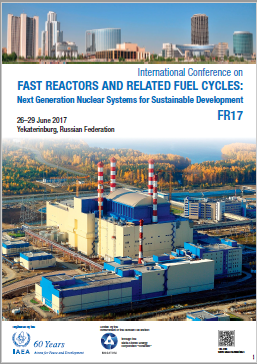Speaker
Irina Portnykh
(Joint Stock Company "Institute of Nuclear Materials")
Description
One of the main issues of fast reactors is to improve their economic efficiency. Nowadays austenitic stainless steel ChS-68 is used as a state material for BN-600 reactor claddings ensuring damage doses up to 87 dpa. Post irradiation examination results show the residual life of fuel elements with possible maximum damage dose up to 92-95 dpa corresponding to fuel burn-up to 12-13 % FIMA. At JSC "VNIINM" a prospective austenitic stainless steel EK-164 (16Cr-19Ni-2Mo-Ti-Si-V-P-B), more resistant to radiation-induced swelling than ChS-68 steel, has been developed to extend service life of fast reactor fuel assemblies.
A trial operation of ChS-68 and EK-164 combined fuel assemblies has been carried out to ensure the operating capacity and assess the capability to improve operational characteristics of fuel elements with EK-164 claddings. At the initial stage maximum damage dose during operation of two test fuel assemblies is 74 and 77 dpa, respectively. Post irradiation examination confirms the advantage of EK-164 steel in terms of radiation-induced swelling resistance.
Manufacturing technology of claddings used as a material for fuel elements operated to maximum damage dose in the range between 84 and 96 dpa has been improved considering structure and EK-164 cladding properties investigation results. Post irradiation examination shows that fuel elements retain their operating capacity and have sufficient residual life. Therefore it is possible to predict the operation resource at damage doses above 110 dpa.
The paper aims to investigate radiation-induced swelling of EK-164 claddings at different temperatures and neutron irradiation doses, and to distinguish radiation-induced porosity characteristics at different irradiation temperatures.
Country/Int. Organization
Russian Federation
Author
Irina Portnykh
(Joint Stock Company "Institute of Nuclear Materials")
Co-authors
Mr
Alexander Kozlov
(Joint Stock "Institute of Nuclear Materials")
Mr
Evgenii Kinev
(Joint Stock Company “Institute of Nuclear Materials”)
Natalia Glushkova
(Joint Stock Company “Institute of Nuclear Materials”)

